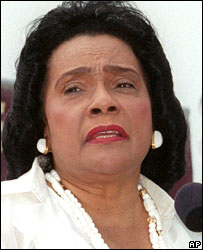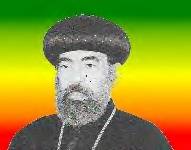Obituary: Coretta Scott King
 Coretta Scott King, the widow of US civil rights leader Martin Luther King, has died aged 78. Mrs King had carried on her husband's work for racial equality after he was assassinated in 1968.
Coretta Scott King, the widow of US civil rights leader Martin Luther King, has died aged 78. Mrs King had carried on her husband's work for racial equality after he was assassinated in 1968.She fought successfully for a national holiday in memory of him and founded The King Center in Atlanta to preserve his legacy.
News of the mother of four's death was reported by former Atlanta Mayor Andrew Young to US network NBC television.
Mr Young, also a civil rights campaigner, said Mrs King had died in her sleep on Monday night. Mrs King had been in poor health in recent years.
She suffered a serious stroke and heart attack in 2005, and earlier this month missed the public marking of her husband's birthday for the first time in two decades.
Mrs King, who met her husband in Boston and married him in 1953, supported him in his civil rights work.
After his death, she raised their four children while at the same time working to secure his legacy.
She recalled in her autobiography, My Life with Martin Luther King Jr, how she had felt compelled to carry on the civil rights movement.
"Because his task was not finished, I felt that I must re-dedicate myself to the completion of his work," she wrote.
In 1969 she founded the Martin Luther King Jr Centre for Non-violent Social Change in Atlanta and in 1986 saw the establishment of a national holiday to mark her husband's January birthday.
Speaking in 2003 on the 40th anniversary of her husband's best known speech, Mrs King urged the crowds to follow the peaceful path he preached.
Mrs. King was vocal in her opposition to capital punishment and the 2003 invasion of Iraq, thus drawing criticism from conservative groups. She was also a vocal advocate of women's rights, lesbian and gay rights and AIDS/HIV prevention.
There is a medal named after Mrs. King that is awarded for excellence in children's literature.
Over the years, she not only was active in preserving the memory of her husband, but also active in other political issues. After her husband was assassinated in 1968, she began attending a commemorative service at Ebenezer Baptist Church in Atlanta to mark her husband's birth every January 15 (now on the third Monday in January since Martin Luther King Day was proclaimed).
She also honored presidents on different occasions. Some of them include being at the state funeral of former president Lyndon Johnson, in 1973, being present when President Ronald Reagan signed legislation establishing Martin Luther King Day, during the 1980's, Coretta King reaffirmed her long-standing opposition to apartheid, participating in a series of sit-in protests in Washington that prompted nationwide demonstrations against South African racial policies. In 1986, she traveled to South Africa and met with Winnie Mandela while her husband Nelson Mandela was still a political prisoner on Robben Island. After her return to the United States, she personally urged President Ronald Reagan to approve sanctions against South Africa. She was present at the first inauguration of George W. Bush in 2001. King received honorary degrees from many institutions including Princeton University and Bates College.
On August 16, 2005, Mrs. King was hospitalized after suffering a stroke and a mild heart attack. Initially, she was unable to speak and move her right side. She was released from Piedmont Hospital in Atlanta on September 22, 2005, after regaining some of her speech and continued physiotherapy at home. Because of complications from the stroke, she was apparently unable to make her wishes known regarding the ongoing debate as to whether her late husband's birthplace should continue to be maintained by the city of Atlanta or the National Park Service. On January 14, 2006, Mrs. King made her last public appearance in Atlanta at a dinner honoring her husband's memory.













